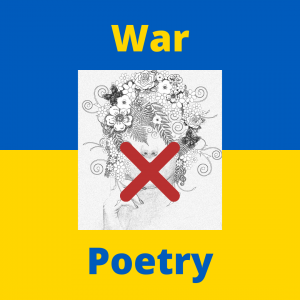 “When arms speak, muses are silent” is the English paraphrase for an aphorism attributed to Cicero, albeit with a slightly different word order. Inter arma enim silent lēgēs is Latin for, literally, “For among arms, the laws are silent.”
“When arms speak, muses are silent” is the English paraphrase for an aphorism attributed to Cicero, albeit with a slightly different word order. Inter arma enim silent lēgēs is Latin for, literally, “For among arms, the laws are silent.”
Currently both laws and muses are silent. Warnings such as “viewers discretion advised” or “Warning! Graphic content” (Reuters); “Contains scenes of sexual violence and scenes which some viewers may find upsetting.” (BBC News); “Some images may be disturbing because of graphic content” (Washington Post) preface the harrowing images on social media and in the news.
Destruction. War crimes. Children robbed of childhood. Wartime sexual violence. Towns reduced to rubble.
War is war. No retouching will soften the blow. The eyes are trained on the horrendous images, whether in the past or now.
One day, you are half asleep when you catch this soundbite in the 6 a.m. news, an 83-year-old babushka-victim speaks in Ukrainian: “I told him ‘I am old enough to be your mother. Would you let this to happen to your mother?’”
Suddenly you are wide awake. Later, perhaps, you track down the news item on CBS television only to find out that she is actually a retired school teacher, like your mother. You cannot find words.
Can poetry find them?––one ponders. “What is war poetry good for?” asked a previous blog post, placing war poetry into a historical context. Nihil novi: nothing new under the sun.
Meanwhile, on the radio: “Next.” The story of the babushka, a babushka of our own, is replaced with the next one. Vanished into in the thin air. “Next” is the word of the media. But the words of poetry will remain, preserving the realities of war, as poet Lyuba Yakimchuk from the occupied Luhansk area presents compelling evidence in her poem Caterpillar. She seems to have found words to describe wartime crimes against women, sexual violence after which one’s favorite color will never be the same.
Are there words? Is there poetry after the Holocaust as, among other questions, the previous post discussed?
In her poem, Decomposition Yakimchuk claims that
there’s no poetry about war
just decomposition
only letters remain
and they all make a single sound — rrr
However, here is the evidence, an entire volume of Ukrainian poetry entitled Words for War: New Poems from Ukraine published by Academic Studies Press (Boston, MA) and Harvard Ukrainian Research Institute (Cambridge, MA), an open-access book available in hardback, paperback, and digital ebook formats.
These poems were not written in the past two months, but they could have been. The 2014 Russian occupation of Crimea and parts of the eastern region of Ukraine popularly called Donbas provide a bleak background to the poems written in 2014–2015 as well as a gruesome relevance today.
In the Preface the editors address the casual reader: “Most of us in the Western world have little firsthand knowledge of war. Normally, we are not forced to face war, fight in a war, flee from war.” Their warning primes the reader for what follows: witnessing history from a dreadful angle, describing the indescribable with words of poetry.
But, as Ukrainian-Russian-Jewish-American poet Ilya Kaminsky wonders in the introduction, “What exactly is the poetry’s witness? The language of poetry may or may not change us, but it shows the changes within us.”
Modes of survival, these poems attempt to reconstruct lost identities, identities stripped of any human traits, as a bird, a dandelion seed, a jellyfish, or a fairy-tale character. Hiding behind powerful lyrical voices are the helpless survivors, with their losses now exposed to the world.
Who are these poets? Where are they now? Read more in Part 2 Arms and Muses: War Poets from Ukraine.
- For the visual types: 30 years in 30 photos, a photo essay capturing thirty years of Ukraine, i.e. the period after becoming independent from the Soviet Union in 1991.
- Read a current story with illustrations, I can do whatever I want to you, The report brought to you by Meduza, an international Russian- and English-language publication, banned in Russia is an example of investigative journalism, another way to understand the destruction in war. Warning: contains graphic content.

A Ukrainian firefighter saves books from the rubble during the Russian invasion, as shared on various Telegram channels, the most up-to-date social media source of snapshots of the war.